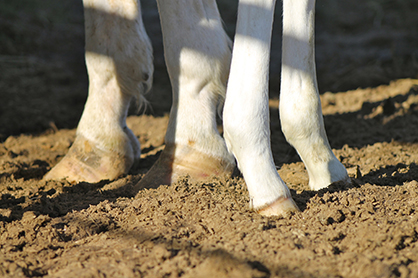Can Detection of Inflammation Help Identify Horses at Risk for Potential Catastrophic Injury?
UK College of Agriculture, Food, and Environment
By: Jenny Evans
The Kentucky Horse Racing Commission recently voted unanimously to fund a project at the University of Kentucky Maxwell H. Gluck Equine Research Center examining inflammatory and anti-inflammatory markers as early indicators for potential catastrophic (life-ending) injury in racehorses.
The occurrence of injuries in horses and jockeys during training and racing is a significant economic and welfare concern for the Thoroughbred industry. While there has been increased interest in the development of techniques to identify individual horses at risk for injury, these approaches have not been widely adopted.
“We have a method to detect inflammation in horses and are proposing to determine its utility in the early detection of an impending catastrophic injury,” said Allen Page, principal investigator and scientist/veterinarian at the Gluck Equine Research Center.
Scientists have made multiple attempts to use biomarkers as indicators of injury, but the data thus far has shown this isn’t reliable. Instead, researchers will rely on measuring mRNA, or the precursors to proteins, from circulating white blood cells.
“Our theory is that these cells pass by areas of bone or soft-tissue damage, which are activated by the damage, and begin producing inflammatory or anti-inflammatory mRNA, which we then measure,” Page explained. “Based on this, our hypothesis for the study is that those Thoroughbred racehorses that experience a catastrophic injury while racing will have evidence of increased inflammation when compared to non-injured horses.”
Researchers in the two-year, $164,488 study, titled “Inflammation in Catastrophically Injured Thoroughbreds,” have been collecting samples since January with the help of multiple state and local racing jurisdictions. Page recently spoke with regulatory racing veterinarians to encourage additional participation in the study, as the ultimate goal is to sample 150 catastrophically injured horses, as well as approximately 1,000 non-injured horses, from across North America.
“By using non-injured horses from the same race, as well as horses in the general racing population, we anticipate identifying patterns of inflammation which may be indicative of a specific injury type,” said David Horohov, co-principal investigator, Gluck Equine Research Center director and Department of Veterinary Science chair. “This may then be of use in the future to help identify horses that need additional examination before a race.”
Page said, while there has been a significant amount of work in the past two decades to take large amounts of data and create models for determining risk factors for racehorse injuries, those models are not being used on a widespread basis yet.
“It’s exciting to think that a single blood sample may be all we need to help identify an individual at-risk horse as we work with the racing industry to further improve the safety and welfare of these incredible athletes,” Page said.
The mission of the Gluck Center, a UK Ag Equine program in the College of Agriculture, Food and Environment, is scientific discovery, education and dissemination of knowledge for the benefit of the health and well-being of horses. The Gluck Center faculty conducts equine research in seven targeted areas: genetics and genomics, immunology, infectious diseases, musculoskeletal science, parasitology, pharmacology/toxicology and reproductive health. Their continuing efforts build upon a tradition of excellence in equine research dating back to 1915. For more information on the Gluck Center, visit http://gluck.ca.uky.edu.











